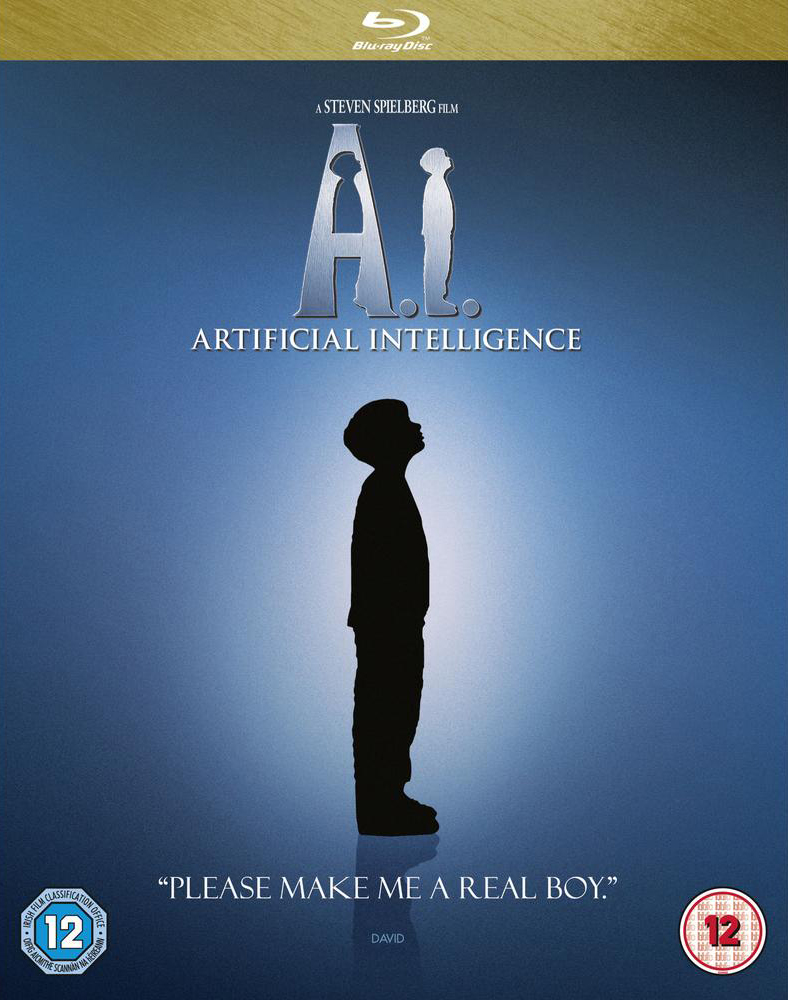A.I. Artificial Intelligence – is a 2001 American science fiction film directed by Steven Spielberg.
The film opens in a world flooded by rising sea levels and introduces us to scientists who are developing lifelike robots with advanced artificial intelligence. One of them produces a robot that can simulate all the behaviour of a child's love for his parents. They look for a family to test this robot and choose one where there own son is in a coma and is unlikely to ever recover. The mother is reluctant but tentatively agrees to try and she is told the "child" will not lock on to her unless she says the correct words. She gradually diverts her affections for her own son onto the robot which convinces her by his behaviour. She decides to go for it, and her grief for her own child is appeased until her own child unexpectedly recovers. Trouble then ensues as jealousy on the part of the real son leads to an incident where the real son is put in danger. The mother realises she needs to get rid of the robot for the sake of her real son but the robot now called "David" cannot be deactivated and if he was returned to his creator it would mean he is destroyed. She retains enough emotional attachment to David to make it impossible for her to return him for destruction so she leaves him to fend for himself in a forest. The world at this time has many robots that have been discarded by humans as being no longer of any use or old models replaced by newer models. One of these befriends him.
David remembers the story of Pinocchio which his "mother" read to her real son in which a wooden puppet is made into a real boy by the blue fairy. So "David" goes in search of the blue fairy who could turn him into a flesh and blood boy and then his mother would love him. He cannot do anything else until this is accomplished, he becomes obsessed with finding her. Meanwhile his creator tracks "David" down and returns him for study to where he was made. There "David" discovers that he has been made in the image of his creators dead son and he finds many more clones of himself waiting to be switched on. Feeling hopeless he drops into the sea.
He continues his obsessive search of the world to regain his mothers love and finally finds a statue of the blue fairy in a fairground that has been flooded by rising sea levels. He waits there under the water for his transformation unable to move on until it is accomplished. He waits for a thousand years and becomes frozen in the sea by a new ice age. He is eventually cut out of the ice by super advanced robots that have taken over from man. He tells them what he wants and in compassion for him make him an offer. Because he has a lock of his mother's hair they can recreate her for him so that he can be with her but their technology only enables them to do it for one day. He accepts the offer.
This part is the most criticised part of the film. It is said that it is sentimental and is typical of Spielberg going for a tear jerking ending, but Spielberg says its not his ending but was in Kubrick's original storyboards. Those critics have forgotten that what they are watching are two robots going through a set of behaviours programmed into them, in the mothers case by another robot . The critics are so caught up in there own unmet needs for parental love that they loose sight of the unsettling truth that parental love is a programmed obsession and not a freely given concern. Parental love is a need not a gift.
After his day of "bliss" with his mother "David" is able to sleep and dream for the first time. He is no longer obsessed with the need from mother and now has room in his system to think of what he and his world might become.
( A Guardian article entitled " Pregnancy leads to permanent rewiring of brain " shows that a mothers love would be automatic unless issues interfere with it. ) |


